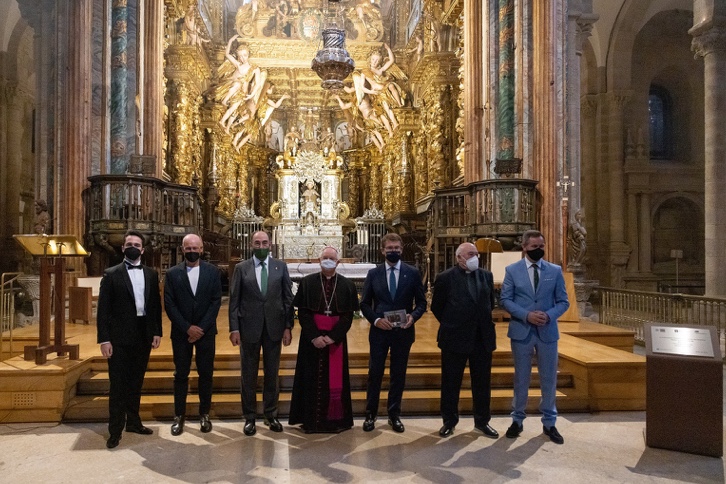News
-
21/07/2021Iberdrola increases investments by 37% to €5 billion and posts adjusted net profit of €1.84 billion (+8.4%) in the first six months Iberdrola reaffirmed its role as a driver of decarbonization, economic recovery and job creation during the first half of the year, after making record investments of €4.9 billion, 37% more than in the same period of the previous year. This investment effort also contributed to the company’s unprecedented expansion strategy in markets such as Europe, America and Asia Pacific. More than 90% of investments were allocated to renewables activities (45%) and smart grids (46%). By markets, more than half went to the United States (27.1%) and Spain (25.4%). Investment in the Iberdrola International business area grew and represented 17.2% of the total, while Brazil received 14.5% and the United Kingdom 12%. The Chairman of Iberdrola, Ignacio Galán, said that “these results are the fruit of an unprecedented investment effort. In a period of great complexity, we have accelerated investment in grids, renewables and storage, promoting economic activity and helping to create quality jobs around the world.” Between January and June 2021, the company achieved a gross operating profit (Ebitda) of €5.44 billion (+10.2%) (up 15%, excluding the impact of COVID-19 and the exchange rate). 85% of the total came from networks and renewables with 80% generated in countries with A rating. Ebitda from networks grew by 10.6%, to €2.56 billion, after ramped up investment and an increase in distributed energy in all the markets where the company operates, particularly Brazil, which completed the integration of the distribution company in Brasilia. Excluding the negative impact of COVID-19 and the exchange rate on this business, Ebitda would have grown by 18.5%. Renewables saw its Ebitda in the period rise by 63%, to €2 billion, driven by the increase in production, greater installed capacity provided by its investment plan and higher load factors. The area also reflects the positive impact of the reversal of the hydroelectric levy for 2013 and 2014 in Spain. Generation and Supply recorded an Ebitda of €803.3 million (-40.9%) and was mainly impacted by high prices in the Spanish electricity market, the impact of Covid and the effects of Filomena storm (Spain) and the cold snap in Texas (United States). Adjusted net profit in the first six months grows 8.4% to at €1.84 billion. As a result of the approved rise in UK corporation income tax for 2023, which goes from 19% to 25% and affects deferred tax liabilities, a restatement of -€463 million has been made. This and other non-recurring items set net profit at €1.53 billion. Ongoing investment plan: more renewables, more networks and new markets Iberdrola's investment plan allowed for the company's renewable operating capacity to grow over the six-month period and it now exceeds 35,600 MW. I n the last 12 months, Iberdrola has commissioned 2,960 MW of new green capacity, of which 1,950 MW are onshore wind, 930 MW solar photovoltaic and 80 MW battery storage. The company, which expects to end the year with an additional 4,000 MW in operation, is currently progressing with the construction of 8,500 MW. By geographies, 1,700 MW (20%) is being built in Spain, Iberdrola Energía Internacional is constructing 2,860 MW and 2,750 MW are under construction in the United States. At present, the company has 1,050 MW of green capacity under construction in Brazil, and 150 MW in the United Kingdom, of which 100 MW are battery storage. Iberdrola has committed to install and commission a total of 27,600 MW in the period 2020-2025, with the aim of reaching 60,000 MW of renewable capacity. As of June 2021, nearly 22,000 MW are under construction or in advanced development, meaning that 80% of the new capacity planned in that period is assured. As of June, the group's project pipeline amounts to 81,500 MW, of which 25,200 MW are offshore wind; 15,500 MW onshore wind; 36,600 MW photovoltaic; 3,400 MW hydro and 1,100 MW batteries. Opportunities for offshore wind growth include new markets such as Japan, Poland, Sweden, Ireland, Korea, Taiwan and Australia as well as traditional European markets (Spain, Portugal, United Kingdom, Germany, France and Italy), the United States and Brazil. To support this phase of expansion, Iberdrola has accelerated the procurement process – which has amounted to €18 billion since the beginning of the pandemic. The company's advance orders help support 400,000 jobs across its global supply chain. Growth platforms: offshore wind, PNM Resources, alliances, and smart solutions One of the group's main growth platforms is the development of offshore wind projects. The company already operates more than 1,300 MW and is progressing on schedule with the Saint-Brieuc (France, 496 MW), Vineyard Wind 1 and Park City Wind (United States, 800 and 804 MW respectively) projects. As well as Baltic Eagle (Germany, 476 MW) in order to double its offshore wind capacity in the coming years. Iberdrola's strategy in offshore wind will be boosted by the auction processes planned in the short term in key markets: Europe (37,000 MW between 2021-2022), US and Asia Pacific (13,800 MW by 2024). The United States is another growth market, with the acquisition of PNM Resources set to be completed before the end of the year. The only pending approval, from New Mexico’s regulator, is now expected in the fourth quarter. This will consolidate Iberdrola as one of the largest electricity distribution companies in the North American industry and the third largest operator of renewable energy. Company alliances are also advancing the process of decarbonization of the economy, as well as the reactivation of industry and employment. Iberdrola continued to incorporate new partners, such as MAPFRE, Total and Shell in renewable energy. It also sealed agreements with bp, Fertiberia, Cummins, Porcelanosa, Diageo and Foresa in green hydrogen and promoted alliances for electrification and electric mobility with Volkswagen, Renault, Irizar and the smart charging solutions company Wallbox which it also supports as a shareholder. Smart solutions for customers also point to growth opportunities, highlighting the expansion of smart solutions in electric mobility, and residential: Smart Mobility contracts have grown nearly three-fold; Smart Solar contracts have more than doubled; and Smart Home and Smart Climate has grown 1.2-fold and 1.4-fold, respectively. More dividends, financial strength and confirmation of guidance for 2021 Iberdrola accelerates the pace of its investments while maintaining the strength of its balance sheet. The company has increased its operating cash flow by 8%, to €4.2 billion. It also strengthened its financial ratios, having trimmed down its adjusted net debt by more than €500 million and increased liquidity at the end of June to €17.6 billion, covering 21 months of financing needs. The group remains a leader in green and sustainable financing, with €32.4 billion, and continues to build on its position as the world’s first corporate issuer of green bonds. The performance of the company was recently supported by its shareholders. At the recent Annual General Meeting shareholders approved the Board’s management and proposals with an average 97.6% of the votes. Dividend per share from 2020 earnings grows 5.5% to €0.422 gross per share. The Group's results and financial strength underpin the company's earnings guidance for 2021, which maintains its profit and dividend expectations for the year. READ MORE
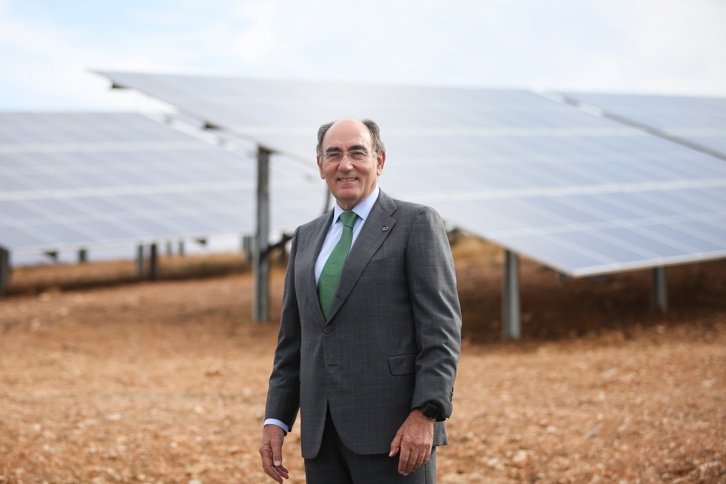
-
19/07/2021Iberdrola and Irizar speed up electrical mobility: Agreement to electrify urban transport and supply green energy Iberdrola, Irizar and its subsidiary Irizar e-mobility are ramping up their commitment to electric mobility by signing a framework collaboration agreement to work together on technological innovations in the electrification of bus transport and provide solutions to the immediate challenges of decarbonisation in the field of urban mobility, electrifying bus fleets and incorporating recharging infrastructure. The alliance began when Iberdrola was commissioned to provide the renewable supply with guarantees of origin (GdOs) at Irizar's factories, with the aim of contributing to the decarbonisation of the life cycle of its buses. The utility will also advise Irizar in all areas that contribute to the sustainability of the group, including energy efficiency projects, self-consumption, etc. Bus electrification, battery recycling and smart charging infrastructure The agreement between the companies includes a joint analysis of urban bus fleet electrification projects, demonstration projects, R&D programmes and specific bilateral projects for developing new technologies applicable to electric mobility and the acceleration of electrification in transport. These projects will involve the electrification of urban transport fleets, the recycling and reuse of batteries from Irizar e-mobility vehicles and smart charging to optimise infrastructure and energy use. The alliance merges the capabilities and strategies of both companies: Iberdrola is a driving force behind the electrification of transport towards a decarbonised economy, while Irizar manufactures and markets buses and industrial vehicles, as well as charging systems and infrastructures for urban e-mobility. The two-year agreement will not only explore joint opportunities for electric mobility, but also consider formulas for collaboration on the decarbonisation of the manufacturing group's network of collaborators. Electric mobility and green recovery Iberdrola continues to push its stance on transport electrification as part of its strategy for a decarbonised economy, as a key factor in reducing emissions and pollution, as well as for a green recovery in the post-Covid world. The company is implementing a sustainable mobility plan , with an investment of 150 million euros, through which it will intensify the roll-out of charging points for electric vehicles in the coming years. The initiative entails installing around 150,000 charge points in homes, companies and on the public road network in cities, as well as on the main motorways over the coming years. Installing a charging station network Iberdrola is aware of the need to boost electric mobility in Spain through coordinated, effective action involving the major players. In this regard, the company has already completed more than 50 infrastructure deployment agreements with administrations, institutions, companies, service stations, dealers and electric vehicle manufacturers. Iberdrola is the first Spanish company to sign up to The Climate Group's EV100 initiative, which has the objective of speeding up the transition to electric vehicles by committing to the electrification of its entire vehicle fleet and streamlining the charging process for staff at its businesses in Spain and the United Kingdom by 2030 In the meantime, Grupo Irizar is still steadfast in its commitment to sustainable mobility and leading the transition to zero emissions to improve urban environments. Through Irizar e-mobility, it offers turnkey e-mobility solutions for sustainable, efficient, smart, accessible, secure and connected public transport. The company is continuing to grow with the implementation of its solutions and collaboration and distribution agreements throughout Europe. READ MORE
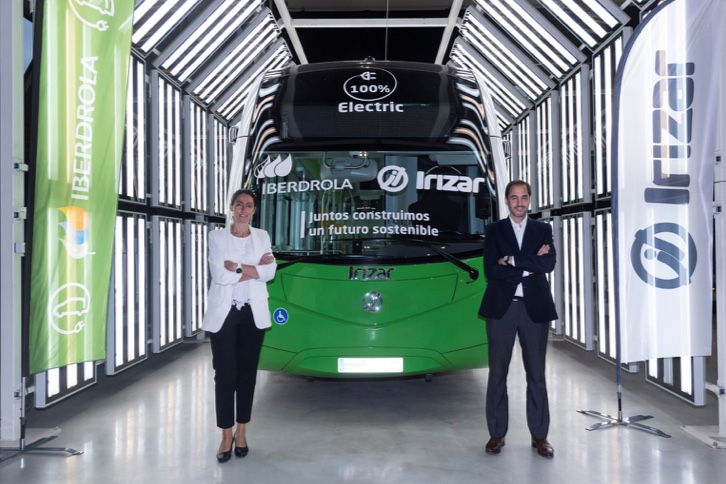
-
19/07/2021Iberdrola and ASAJA enter into an energy alliance to drive zero-emissions arable and livestock farming Iberdrola and ASAJA have entered into a strategic alliance to promote sustainable and emission-free arable and livestock farming. To do this, they have designed a work plan with two basic vectors: On the one hand, they will promote actions aimed at improving energy efficiency and, on the other hand, they will launch initiatives to continue preserving biodiversity and caring for the rural environment. The agreement includes initiatives related to improving competitiveness in the countryside, such as the dissemination of renewable energy technologies suitable for rural areas and their electrification through the implementation of energy efficiency solutions, self-consumption and sustainable mobility. It will also make it possible to launch projects to improve environmental sustainability, related to capturing CO2 — by creating green spaces that absorb and offset emissions from other sectors —, the circular economy and new, zero-emissions fertilisers. The alliance combines the knowledge and capabilities of two leading organisations that are committed to the energy transition and the green economy as a way to transform and recover the country's primary sector. Iberdrola is gaining a benchmark partner with an extensive geographical presence and understanding of the farming and livestock industry, while ASAJA is linking itself to a leading company in renewable energies in the country and at a global level. According to Iberdrola Chairman Ignacio Galán, "ASAJA is an excellent ally for promoting projects in future technologies in rural areas and to increase the opportunities for economic and environmental efficiency offered by the energy transition for arable and livestock farmers in this country. Today, we are setting out together on a road that will take us to solid commitments and concrete initiatives, to advance toward an emissions-free economy, also in the farming sector, while we promote competitiveness and economic development in the countryside". Meanwhile, Pedro Barato, the president of ASAJA, said: “We have great hopes for this partnership with Iberdrola, which we see as playing a strategic role for achieving the goals we have set ourselves. The circular economy, CO2 capture, energy efficiency and producer cost reductions are short- to medium-term goals that are set to be become a reality in the agricultural sector”. Creating green spaces, reforestation and improving pastureland Iberdrola looks upon the preservation of the biological diversity of ecosystems as an essential part of its strategy, ensuring a supply of competitive, clean, and sustainable energy which is also entirely compatible with the environmental balance and is committed to achieving the full preservation of biodiversity by 2030. In this regard, the agreement signed with ASAJA entails commissioning initiatives to capture the CO2 produced in other sectors, like industry and transport, by creating green spaces to absorb and offset it. On the one hand, it will explore the possibility of reforesting land that is not in use, giving it additional value. On the other hand, pastures around photovoltaic plants and wind farms and their surroundings will be improved, which will retain more water and increase yields from pastures. In the last three years, Iberdrola has carried out more than 1,450 actions to protect biodiversity, combining the development of renewable projects with the conservation of the diversity of flora and fauna by taking care of natural heritage. It has also set itself a reforestation target of 20 million trees by the end of the decade, capable of capturing approximately six million tons of CO2 in 30 years. The company will plant 2.5 million trees next year and 8 million by 2025. Smart solutions for self-consumption based on renewables The type of buildings in rural areas (low-rise buildings, single-family homes and large-scale installations) and the maturity of the environmental awareness of the rural population make self-consumption, aerothermal energy for air conditioning and energy efficiency ideal solutions for improving farm productivity. In this context, many years ago now Iberdrola launched Smart Solar , a comprehensive solution for the generation and self-consumption of photovoltaic energy that gives savings on electricity bills and incorporates all the advantages of digitalisation, making it ideal for the farming community. This type of generation can be combined with on-site PPAs, long-term energy sales contracts for companies and farm activities. Electric mobility and green recovery The average commuting distance in rural areas, which usually does not exceed a range of 20-30 km, makes electric mobility an ideal solution for the countryside. Iberdrola is committed to the electrification of transport as a key lever for reducing emissions and pollution. The company is implementing a sustainable mobility plan through which it will install 150,000 charging points in homes, businesses, urban roads, cities and major motorways. Its commitment to the deployment of high-efficiency stations will see the installation of ultra-fast (350 kW), super-fast (150 kW) and fast (50 kW) stations. Aware that promoting electromobility requires coordinated action between agents from across all sectors, Iberdrola has finalised more than 50 infrastructure deployment agreements with administrations, institutions, service stations, dealers and electric vehicle manufacturers. READ MORE
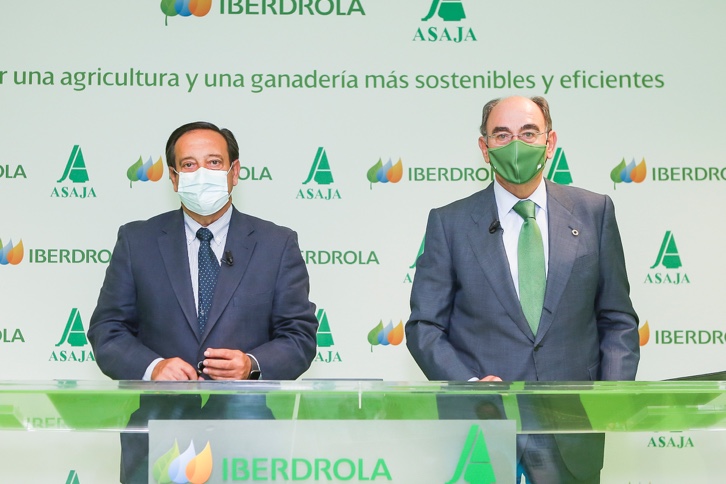
-
16/07/2021Iberdrola is launching a campaign to support the female athletes who will be taking part in the Games As part of its global commitment to gender equality and the promotion of women's sport, Iberdrola has designed a campaign aimed at supporting the sportswomen who will be in action at the Games in order to highlight their achievements in Tokyo over the next few weeks. The initiative includes a variety of activities. In the evening prior to the opening of the Games, namely on Thursday 22 July, an event will be held attended by Carolina Marín, Desirée Vila, Loida Zabala, Amanda Sampedro, Garazi Sánchez, Teresa Díaz and Silvia Arderius, who will be sending messages of support to all the Spanish sportswomen competing in the Games. The Lázaro Galdiano Museum will be the venue for this festival of Spanish sport and provide the backdrop for the official launch of a video featuring eight women representing different cultural fields such as Alaska, Hiba Abouk, Ana Rosa Quintana, Carmen Posadas and Ana Guerra , among others, who have been brought together by Iberdrola to transmit their energy to Spain's female representatives in Tokyo. During the event the attendees will take part in a healthy cooking master class given by Samantha Vallejo-Nájera. Iberdrola will also be setting up a temporary radio studio in “Casa España”, headquarters of the Spanish Olympic Committee to record a series of special programmes featuring guest sports personalities who will discuss the performances of Spain's sportswomen at the Games and relate their own Olympic experiences. Each programme will consist of hour long recordings made between 26 and 30 July and 2 and 6 August, which will be broadcast via digital platforms. Iberdrola, a pioneer in promoting women's sport Promoting women's sport has become a key ambition for Iberdrola, and the promotion of true equality between men and women one of its essential values. In 2016, Iberdrola became the first company to make a firm and global commitment to women's equality and empowerment through sport. Currently, the company supports 16 federations and their respective leagues: gymnastics, triathlon, rugby, canoeing, badminton, football, handball, volleyball, hockey, table tennis, athletics, karate, boxing, surfing, ice sports and fencing. Iberdrola also lends its name to 22 national top-tier sports leagues, and 35 other competitions. At the same time, the provision of resources, facilities, medical services and referees, as well as support and sponsorship for different initiatives in this field from Iberdrola, has not only helped to increase the number of federated sportswomen in these disciplines by 39 % (taking it above 300,000), it is also allowing Spanish elite sportswomen who have built their sporting careers in other countries to start competing again in Spain, leading to an improvement in the standard and visibility of domestic competitions READ MORE

-
15/07/2021Iberdrola and Shell work together to bid on the first floating offshore wind projects in the United Kingdom Iberdrola, through its subsidiary ScottishPower, and Shell have joined forces and are pooling their experience to launch the first large-scale floating offshore wind farms in the United Kingdom. Both companies are bidding on several proposals to develop these pioneering installations to the northeast of Scotland within the ScotWind Leasing programme convened by Crown Estate Scotland and the deadline for submission was today. ScotWind Leasing is the first round of seabed auctions for the development of wind energy in Scottish waters in more than a decade and will grant ownership rights to develop new large-scale offshore wind projects, including, for the first time, floating wind power. Crown Estate Scotland is expected to announce the results of this new round in early 2022. With decades of experience working offshore, a significant presence in Scotland and a track record of delivering some of the world's most complex and innovative energy infrastructure projects, Iberdrola's UK subsidiary and Shell form the optimal team to bring these new projects to fruition. Floating offshore wind - a relatively new technology still under development - is particularly suitable for deeper water areas, where it is not possible to install fixed foundations. This makes it an ideal solution for developing floating offshore projects in Scottish waters, which will become increasingly important within the United Kingdom's energy mix, as it adds more and more renewables to comply with the Net Zero targets. ScottishPower's CEO, Keith Anderson, explained that "the combined knowledge, experience and know-how of ScottishPower and Shell makes this alliance ideal to lead the development of large-scale offshore floating wind farms, creating a new green industry with huge potential to export skills and expertise globally and help the UK to decarbonise its power generation". "With the United Nations COP26 climate change summit in Glasgow just months away, ScotWind will help to create a new floating wind industry, which will play a crucial role in setting the country on the path to a cleaner, more sustainable future," added Anderson. David Bunch, the president of Shell UK, added: "If our bid is successful, Shell and ScottishPower are committed to working with Scottish communities and businesses to help develop the supply chains and expertise that will make Scotland a world leader in floating wind energy. At Shell we are continuing to increase our capacity to generate, market and deliver cleaner energy for our customers and to play our part in the UK's energy supply towards climate neutrality". Towards global wind power leadership, also at sea Iberdrola operates more than 1,300 MW of wind power, in the German Baltic ( Wikinger ) and in the United Kingdom (East Anglia One and West of Duddon Sands). This capacity will double in the coming years with projects developed in Germany (Baltic Eagle ), France (Saint-Brieuc ) and, in the US, on the coast of Massachusetts, United States (Vineyard Wind I ). The significant expansion of Iberdrola's portfolio of offshore wind projects in the last twelve months - 20,000 MW by the end of the first quarter of 2021 - strengthened by new growth platforms in countries like Japan, Poland, Sweden and Ireland, will enable the group to amass 12,000 MW of offshore wind in operation by 2030. Of this portfolio, almost half is ready to start construction: Kitty Hawk (North Carolina, 2,500 MW); Zone 522 (Massachusetts, 3,400 MW); East Anglia Hub (North Sea, 3.100 MW) and Windanker (Baltic Sea, 300 MW). The company also has more than 10,000 MW under development in Sweden (3.6 GW), Japan (2.7 GW), Poland (2-3 GW) and Ireland (3 GW). Iberdrola is in an optimal position for taking part in auctions and invitations to tender in the coming months in its new growth platforms: United States, which will bid for 3,200 MW; United Kingdom (up to 12,000 MW), Japan (3,000 MW), Germany (900 MW), France (up to 2,250 MW), and Denmark (up to 2,200 MW), And now, Scotland, too. Green investments to promote economic recovery and employment Iberdrola has been leading the energy transition for two decades and acting as a key driving force in the transformation of the industrial fabric and the green recovery of the economy and employment. The company has launched a historic investment plan worth 150 bn euros over the next decade - 75 billion euros by 2025 - to triple renewable capacity and double network assets and take advantage of the opportunities offered by the energy revolution facing the world's leading economies. Having invested €120 bn in the last twenty years, Iberdrola is a leader in renewable energy with nearly 35,000 MW installed; a volume that makes its generation park one of the cleanest in the energy sector. With its emissions of 28 kg CO2/kWh already two-thirds lower than the European average, its strategy of investing in clean energy and grids will lead Iberdrola to be a “carbon neutral” company in Europe by 2030. READ MORE
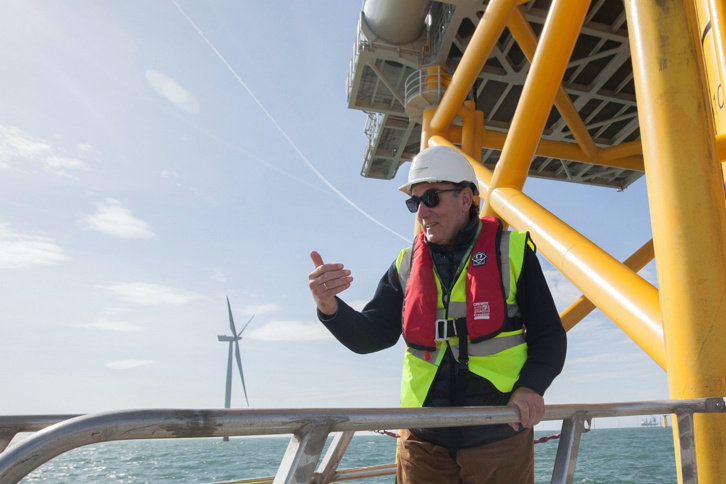
-
12/07/2021Iberdrola awards fabrication of Baltic Eagle foundations to EEW SPC and Windar Iberdrola has finalised the procurement process for Baltic Eagle with the award of the project’s last key contract, the manufacturing of offshore foundations, to EEW SPC and Windar. German company EEW SPC will deliver 50 monopiles while Spanish company Windar will fabricate the same number of transition pieces, which links the turbine towers to the foundations. Both companies have extensive experience in the offshore wind sector, having supplied components and equipment to numerous projects across Europe. The monopiles will be fabricated at EEW’s mega-factory in Rostock, located by the Baltic Sea. Grouped into deep and shallow clusters, the monopiles are between 9m and 8.75m in diameter and their range in length varies from 75 to 90 meters, depending on the water depth for each wind turbine position. The heaviest monopile is 1,402 tonnes and EEW SPC will be processing about 64,600 tonnes of steel for this order, starting in January 2022 and running through to January 2023. Load out will begin in April 2023 and the installation campaign is scheduled to last approximately six weeks. The main construction activities for the transition pieces will be carried out in Windar´s shipyard located in Avilés. This manufacturing process will involve some 30 Windar suppliers in the North of Spain, including steel production, components, equipment, testing and auxiliary machinery companies. The contract will create 800 jobs and 1.3 million man-hours. Fabrication works will begin in October 2021 and will run through to December 2022, with load out planned for the beginning of 2023. Iris Stempfle, Country Manager for Iberdrola in Germany, said: “The manufacturing phase of Baltic Eagle will involve multinational companies with facilities in five European countries, including Germany, Spain, Denmark, the Netherlands and Belgium. We are very pleased that Iberdrola’s investments are making an important contribution to Europe’s green recovery. In addition to a remarkable job creation during construction, we plan to increase staff at our O&M base in the port of Sassnitz–Mukran, in the island of Rügen, to serve Iberdrola’s Baltic Sea Hub while fostering the share of local added value.” With a production capacity of 476 MW, the Baltic Eagle offshore wind farm will supply renewable energy to 475,000 households, while saving nearly one million tons of CO2 emissions each year. It is scheduled to be fully operational by the end of 2024. Offshore wind developments in the Baltic Sea The Baltic Sea holds an incredible potential of 93,000 MW for offshore wind in Europe. Alongside Germany, several countries, such as Poland, Sweden and Estonia are exploring new opportunities for offshore wind developments. By 2024, Iberdrola’s Baltic Sea Hub will comprise 826 MW (Wikinger with 350 MW in operation since 2017 and Baltic Eagle with 476 MW) and will act as a centre for offshore and onshore services, as well as providing local content for Iberdrola's projects in the Germany-Poland-Sweden axis. In the German Baltic Sea alone, Iberdrola is planning to increase installed capacity to more than 1,1 GW by end of 2026. Iberdrola`s current offshore wind portfolio includes projects in the German Baltic Sea (Wikinger and Baltic Eagle), in the North Sea (East Anglia ONE and East Anglia Hub), the Irish Sea (West of Duddon Sands), the coast of Massachusetts (Vineyard Wind ) and France (Saint Brieuc ). The significant expansion of the offshore wind pipeline over the past twelve months -20,000 MW at the end of the first quarter of 2021- bolstered by new growth markets with high potential, such as Japan, Poland, Sweden and Ireland, will enable the group to have 12,000 MW offshore wind in operation by 2030. Green investments to promote economic recovery Iberdrola believes that the energy transition can act as a key driving force in the transformation of industry, a green economic recovery and job creation. With this focus Iberdrola has launched a major €75 billion investment plan for the 2020-2025 period, with the aim of doubling its renewable capacity and taking advantage of the opportunities created by the energy revolution in the world's major economies. After twenty years driving the energy transition, with investments of over €120 billion, Iberdrola is a leader in renewable energy, with an installed capacity of more than 33 GW, making its generation fleet one of the cleanest in the energy industry. With CO2/kWh emissions already two thirds lower than the European average, the investment strategy in clean energy and networks will lead Iberdrola to become carbon neutral in Europe by 2030. READ MORE
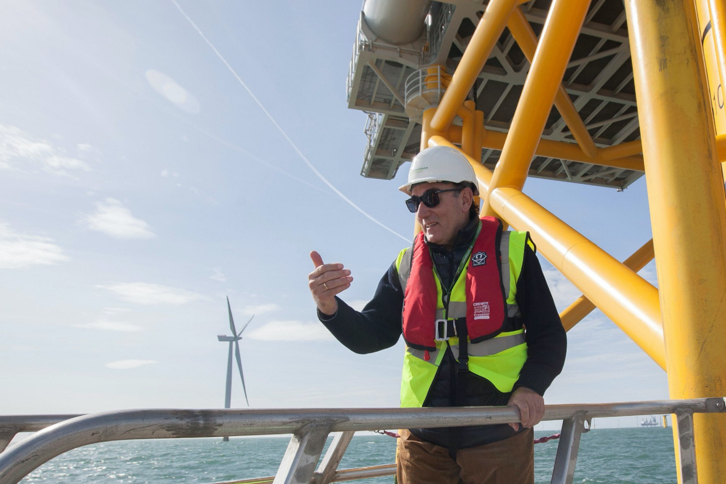
-
12/07/2021Iberdrola y MAPFRE avanzan en su alianza estratégica, que incorpora 100 nuevos MW a través de una sociedad conjunta Iberdrola y MAPFRE avanzan en su alianza estratégica en el ámbito energético que los ha llevado a invertir conjuntamente en energías renovables en España. Ambas compañías han constituido Energías Renovables Ibermap S.L, un vehículo pionero de coinversión que, tras incorporar 95 nuevos megavatios (MW), cuenta ya con 325 MW: 195 MW eólicos operativos y 130 MW fotovoltaicos en desarrollo. La alianza entre ambas empresas líderes contempla la incorporación de más activos hasta que la inversión conjunta alcance los 1.000 MW. El vehículo de coinversión constituido está participado en un 80% por MAPFRE , mientras que Iberdrola mantendrá el 20% que, además, se encargará de la promoción, construcción y mantenimiento de los proyectos renovables. Los 95 MW recientemente incorporados se corresponden con parques eólicos operativos, todos ellos en Andalucía, y se suman a los 230 MW anunciados en abril. De estos, 100 MW eólicos están también operativos y se ubican en Castilla y León. Los 130 MW restantes son fotovoltaicos, se encuentran en fase de desarrollo en Castilla-La Mancha, y su puesta en marcha está prevista durante el tercer trimestre de 2022. El proyecto entre ambos líderes acaba de echar a andar con el lanzamiento por parte de Mapfre del primer fondo de renovables Mapfre Energías Renovables I F.C.R., a través del cual el grupo asegurador va a canalizar su inversión. Además, como ha sucedido en otras inversiones similares de MAPFRE en activos inmobiliarios, infraestructuras, capital riesgo o inversiones tradicionales, este fondo está abierto a otros inversores institucionales. Más apuesta por las inversiones La alianza de Iberdrola y MAPFRE permite combinar la fortaleza y capacidades de dos compañías líderes, comprometidas con la transición energética y la economía verde como vía para la recuperación de la industria y el empleo y la transformación del tejido industrial del país. Iberdrola incorpora a un socio en el desarrollo de su plan de crecimiento renovable en el país y en su estrategia de rotación de activos, mientras que MAPFRE refuerza su apuesta por las inversiones sostenibles en España con un líder mundial en renovables. A finales del año pasado, realizó el primer cierre de su primer fondo de infraestructuras, por importe superior a los 300 millones de euros, que lanzó junto a ABANTE para invertir en fondos de Macquarie Infrastructure and Real Assets (MIRA), el mayor grupo de infraestructuras del mundo. La apuesta de MAPFRE por la Inversión Socialmente Responsable es una de las señas de identidad de su gestora, MAPFRE AM , que es la mayor gestora independiente en España con más de 40.000 millones de euros en activos bajo gestión. Además, es la única entidad española que ha obtenido la prestigiosa certificación ISR Label por parte del Ministerio de Finanzas francés. En los últimos meses, Iberdrola y MAPFRE también han avanzado en el acuerdo por el que la red comercial de la aseguradora en España, integrada por cerca de 3.000 oficinas, ofrece productos personalizados y 100% renovables de la compañía energética. MAPFRE cuenta con los servicios de Kobus Partners para la gestión del fondo, mientras que Blue Tree Asset Management y King & Wood Mallesons han actuado como asesores técnico y jurídico, respectivamente. Inversiones verdes para promover la recuperación económica Iberdrola lleva dos décadas liderando la transición energética y actuando como agente tractor clave en la transformación del tejido industrial y la recuperación verde de la economía y el empleo. La compañía ha lanzado un plan de inversión histórico de 150.000 millones de euros en la próxima década -75.000 millones de euros para 2025-, con los que triplicar la capacidad renovable y duplicar los activos de redes y aprovechar las oportunidades de la revolución energética que afrontan las principales economías del mundo. En España, las inversiones a 2025 ascienden a 14.300 millones de euros, destinadas principalmente al despliegue de un ambicioso plan de renovables y redes eléctricas inteligentes. En España, es líder en el sector renovable con una capacidad instalada de más de 17.500 MW, que su plan de inversión a 2025 elevará a 25.000 MW. Tras inversiones de 120.000 millones de euros en los últimos veinte años, Iberdrola es líder en energía renovable con 35.000 MW instalados en el mundo; un volumen que convierte a su parque de generación en uno de los más limpios del sector energético. Con unas emisiones de 28 grCO2/kWh, que son ya dos tercios inferiores a la media europea, la estrategia de inversión en energía limpia y redes llevará a Iberdrola a ser una compañía “neutra en carbono” en Europa en 2030. READ MORE
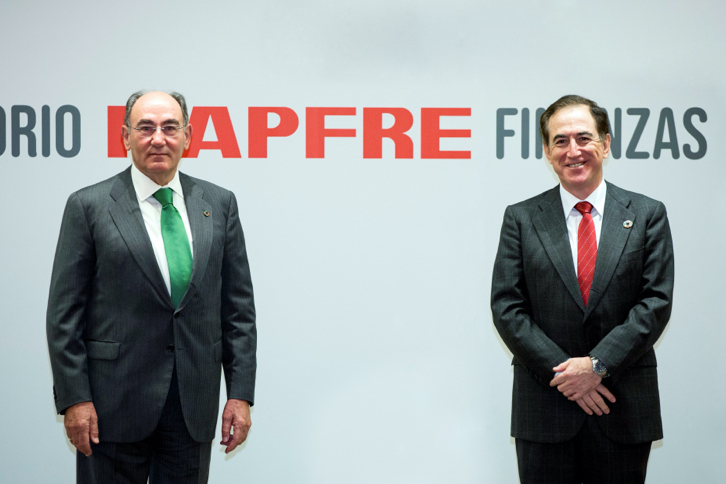
-
09/07/2021Iberdrola revitalises Santiago Cathedral with new interior lighting in a Compostela Jubilee Year The Cathedral of Santiago de Compostela has unveiled its interior lighting today, following the culmination of a project carried out by Iberdrola over the last two years — through its Foundation in Spain — along with the Cathedral Chapter, with the aim of revitalising the church in a Compostela Jubilee Year and providing it with lighting that respects both the history and the current reality of the monument. The inauguration ceremony for the new lighting, held this afternoon, was attended by the president of the Regional Government of Galicia, Alberto Núñez Feijóo; the chairman of Iberdrola, Ignacio Galán; the archbishop of Santiago de Compostela, Julián Barrio Barrio; the presiding dean of the Cathedral, José Fernández Lago; and the canon of the Cathedral Foundation, Daniel C. Lorenzo Santos, among other officials. In his speech, Ignacio Galán noted that it is “a true honour for Iberdrola to have contributed, once again, to the conservation of this church, which we have performed with the same emotion as that felt so many thousands of devotees when they arrive in Santiago, the destination for all the major Christian pilgrimage routes and the nerve centre of so many artistic and cultural movements since the early Middle Ages”. He added that “we are carrying out this action in the most universal of Galicia’s monuments, with the same enthusiasm and the same commitment with which we are committed to this land, which is ours, promoting the energy transition, industrial development and the generation of sustainable and quality employment”. The interior lighting project in Santiago is part of Iberdrola’s Illumination Programme and adds to other collaborations undertaken in Santiago Cathedral since 2004 by the company, including the lighting of the Holy Door, the total renovation of the lighting in 2015, together with the electrical control and installations in the Main Chapel and the Sepulchre of the Apostle. Combining the history and the current reality of the temple The interior lighting work in Santiago Cathedral has included the installation of 700 light fittings, with a total power of 15.8 kW, which allow for renewed lighting of different elements in the church, such as the naves, the transept, the ambulatory, the triforium and the Pórtico de la Gloria. Through this action, energy efficiency has been improved by 61 % compared to the previous light fittings, which will prevent the emission of 6.7 tonnes CO2 into the atmosphere per year. Among other elements, the project has exclusively designed 36 new lamps inspired by the Cathedral’s old votive lamps which, suspended in the central nave and transepts, bring back the lighting of the time when the church was lit by candles. Equipped with the latest lighting technology, they have 12 LED emitters each and are powered directly from the cables that anchor them to the ceiling and keep them suspended. The installation of the new lamps, which together with other lighting components are managed by a control system, helps to create a different ambience depending on the time of the visit: without worship, with ordinary worship or solemn worship. After several years of studies by experts and in coordination with the other restoration work being carried out on the Cathedral, the natural light in the basilica during the day has been evaluated to design an artificial light scheme that is superimposed as a different visual layer, avoiding the classic lighting of the vaults. The light in the Cathedral has traditionally been expressed on two different planes. On the one hand, the artificial light, on a plane more or less close to the ground for reasons of available technology and maintenance, with warm colour temperatures and deployed through solutions such as candles, candlesticks, votive lamps, etc. While, on the other hand, natural light has been the protagonist in the higher sections. An abundant light with cool colour temperatures. The current project is based on this duality to generate an attractive visual experience for visitors and worshippers. The sequence of suspended lamps contrast with the natural light provided by the rose windows and the dome allowing for a narrative that respects both the history and the current reality of the church. Energy transition, industrial development and sustainable, quality employment Iberdrola has been operating in Galicia for decades; a region where it has consolidated its position as the leading renewable energy company -with the management of more than 2,000 MW of green energy-, and where it continues to promote the energy transition and, with it, industrial development and the generation of sustainable and quality employment. The socio-economic impact of its activity in the region exceeds 400 million euros per year between investments, purchases, salaries and tax contributions. The company’s commitment to future technologies has also made Galicia an industrial benchmark in offshore wind power, with the participation of local suppliers in the projects it is developing around the world. This is the case for the Wikinger offshore wind farm, which Iberdrola operates in the German Baltic Sea, as its foundations were manufactured in Fene/Navantia. More recently, it has also been the case for the contracts for Saint Brieuc, which will contribute to the construction of this offshore wind farm in Brittany, France; and agreements to manufacture components for future offshore wind farms. Enhancing the value of Spain’s historical and artistic heritage Through its Foundation in Spain, a significant number of Iberdrola's activities are dedicated to promoting the social value of culture and enhancing the country’s artistic wealth. Since 2011, and with an investment of 12.6 million euros, it has implemented two main lines of work: its Restorations Programme, to conserve pictorial and artistic heritage; and its Illumination Programme, focused on the care, conservation and enhancement of historical and artistic wealth. The main objective of the Lighting Programme is to intervene in unique buildings to install or improve their interior and/or exterior lighting systems in order to enhance their historical-artistic heritage. Since 2011, the actions carried out in this area have improved the lighting to more than 40 monuments across Spain, including the historic Roman Bridge of Alcántara, in Cáceres; the façade of the Congress of Deputies, in Madrid; the Cathedral of Ávila, and the interior of the New Cathedral of Salamanca. Another unique initiative is the Illuminating the Prado programme, a comprehensive lighting project for the Prado Museum using LED technology that is a pioneer and a benchmark in Europe. READ MORE
